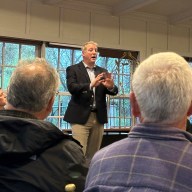Whenever possible, Stephane Lariviere buys locally produced food, even when it’s more expensive.
The Gatineau resident, who estimates that half of the food he buys is locally produced, said it’s a matter of health and supporting the local region.
“We don’t really care about saving money,” he said.
Lariviere was one of thousands of people who came out to the opening day of the Ottawa Farmers’ Market at Lansdowne Park yesterday.
“I’ve noticed in the past year or two that we’re getting a lot more interest in eating locally,” said Mike Kositsin, a beekeeper from Ottawa Valley Honey in Arnprior.
The popular 100-mile diet — where people eat foods grown, produced and sold within 100 miles of their homes — is made easier by farmers’ markets.
Aside from being touted as fresher and more environmentally and economically sustainable, there are health benefits people wouldn’t expect, said Kositsin.
“When you’re buying local honey, be it from me or anyone else, you’re getting honey from the flowers that are in your area. So if you have pollen allergies, you can eat a little bit of honey from your local area daily, and over time, it would make your allergies less,” he said.
Over at the Fitzroy Beef Farmers booth, most of farmer Danny Dolan’s customers make it a point to buy local.
“There are no growth hormones in our animals and they’re antibiotic free, where the stuff in the grocery store, it’s more commercial and you don’t know what’s in it,” said Dolan, who works 40 minutes west of Ottawa.
“When you’re buying from us, you know exactly where it came from.”
“I know exactly what goes into my products,” said Isabel Pochadt of Dough and Beyond in Arnprior.
Most of the ingredients in her baked goods and preserves, including the flour, beans and dry goods, are locally sourced, she said, so when people support her, they’re also supporting local farmers.
It’s not just about food, said Kositsin. “Anything you can do local is better. If you start with your food and start branching it out into the rest of your life, that’s how you make the economy sustainable.”
















